 There are very few things in the world that don’t have some type of award associated with it. Things like the growing the best beard, filling the worse lawsuit and even having a good twitter post can net you a trophy. Board games are not immune from this human phenomenon and the most famous of the board game awards is the Spiel des Jahres. When the nominees in 2013 were announced, one game on the list made people scratch their heads. Qwixx wasn’t really a game on most people’s radar. It was a bit of a surprise to get nominated because traditionally, light dice games don’t make the cut. Today we will be reviewing Qwixx to see if this game is worth your investment. Let’s go!
There are very few things in the world that don’t have some type of award associated with it. Things like the growing the best beard, filling the worse lawsuit and even having a good twitter post can net you a trophy. Board games are not immune from this human phenomenon and the most famous of the board game awards is the Spiel des Jahres. When the nominees in 2013 were announced, one game on the list made people scratch their heads. Qwixx wasn’t really a game on most people’s radar. It was a bit of a surprise to get nominated because traditionally, light dice games don’t make the cut. Today we will be reviewing Qwixx to see if this game is worth your investment. Let’s go!
Qwixx is a dice rolling game for 2-5 players to complete in about fifteen minutes. In my experience, the game plays well at all player counts.
Game Overview:
In Qwixx, players are attempting to score as many points as they can. Each turn, one player will roll a set of six or five dice. Players will add these dice rolls together to cross out numbers in the four color-rows on their score pad. At the end of the game, players will score increasing value of points for each number they have crossed off in each row. Players will total their scores and the player with the most points wins.
Components:
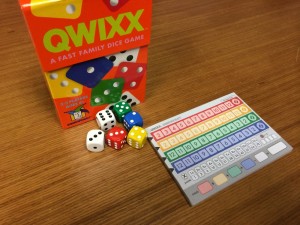
The components in this game are sparse. There is a set of six dice in the game, a rule book, and a score pad. The dice are high quality and the paper score sheets are double sided, so they should be able to last you through plenty of games. The sheets do require a writing utensil that isn’t provided, however. Not a big deal, but I’m just used to games like this having them in the box. I very rarely talk about the box a game comes in, but I love the design of this one. It has a flap on the top the keeps the contents from spilling out because it remains closed by the power of magnets. No matter how much this game gets thrown around it won’t open. I think it’s a design that should be used for all games that can fit into a small box.
How to Play:
At the start of the game, players all receive their own scoring sheet. Let’s examine these sheets a little. Four color rows take up a majority of the space on these sheets. Red and yellow rows list the numbers 2 through 12 in ascending orders, while green and blue are in descending order, left to right across the paper. This order matters because you can only cross off numbers to the right of the last number in that row you crossed off minus the first one. For example, once you cross 4 off in the red row, you must cross of a number 5 or higher and kiss spots 2 and 3 goodbye.
On the right of the rows is a boxed area that requires that you have marked off five spaces in the row before you can cross off the 12 or 2. Once a player does this, the row is locked after the turn is complete and no one can cross out numbers in that row. The die of that color is also removed from the game. The rest of the sheet has an area for you to tally points and the value you gain for the amount of numbers you have crossed off in each row.
Each round one player will roll all the dice remaining in the pool. At the start of the game the pool consist of two white dice with another die for each of the color rows on the scoring sheet. Once the dice have fallen, two actions will take place.
1. The active player (the one who rolled the dice), will total the number on the white dice and announces that to the table. All players are allowed, but not required, to cross off a number in any of their rows as long as it’s a valid play.
2. The active player can also mark off another, but not required, spot on their scoring sheet. They do this by adding one of the white die with one of the color dice rolled that turn. The number marked off must come from the row of the color that matches the dice the player used.
If the active player is unable to cross off a spot on their sheet from the processes listed above they must take a “minus five” penalty at the end of the game. Once their turn is done, they pass the dice to the person on their left and the turn starts over again. The game will end when either two rows have been locked or a player has taken four “minus five” penalties. Players will then total their points for each row, add them together and subtract any negatives. The person with the most points is the winner.
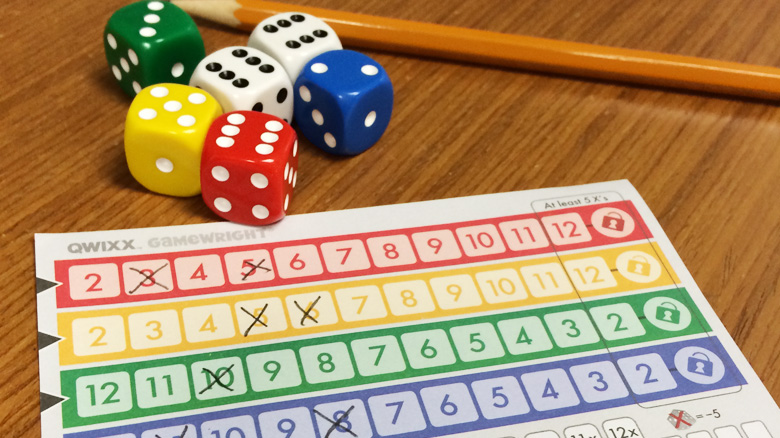
Game Experience:
When I pulled the components out of the box my mind was filled with memories of playing Yahtzee. The scoring pads and rolling dice made me think this game will be a similar experience. I didn’t go into the game with the highest expectations because Yahtzee is kind of a boring game. After playing Qwixx, I’m glad my initial impressions were wrong.
I’m actually surprised at the level of enjoyment I got out of Quixx. Even though the game seems like it would be a game of complete luck, players do have choices to make in the matter. Qwixx gives the player freedom to decide what row and number you want to mark off on your turn. When you are the active player, you have potentially nine combinations of dice to decide which number to cross off on your scoring sheet. This ultimately helps to mitigate bad dice rolls from ruining a player’s chances, so normally players will have plenty of options. Before you mark off a number you have to weigh the cost of that decision. “What points am I leaving on the table by skipping numbers”, “how many spaces do I have left to cross of in that row” and “how quickly can I lock this row” are all things you have to consider. All this leads to players having to think about what they are doing rather just mindlessly crossing numbers off.
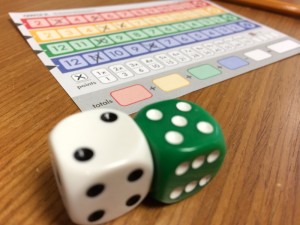
With other dice rolling games, players normally just wait around for their turn. The mechanics in this game forces it to be lot more engaging because with every roll, each player can do something. Instead of just sitting there casually waiting for your turn, players are now invested in what the dice total. This makes players have to stick around at the table until the game is over rather than checking their phones or doing something else. I think this is something that a filler game needs. It grabs your attention from the start to finish.
One issue with the game play is that it felt very similar each time I played. This is all a function of how the game is set up. Because the starting numbers for each row are low probability, it takes longer for players to start crossing off numbers. After a few rounds, players will start to mark off numbers at a furious pace because of the higher probability numbers are in the middle of each row. This eventually leads to another slowdown because to lock a row, we are back to numbers that are unlikely to be rolled. This can lead to crushing disappointment as you are just trying to roll that last number you need to lock out a row. This doesn’t make the unenjoyable, you just have to know that you are not going to get a new experience when you play it.
The game is extremely easy to teach. After a quick read through the rules, I was able to start playing the game quickly. We did have some rule clarifications that were needed, but anything that came up was answered in the rulebook. As long as players can add and know to look left to right on the scoring sheet you are good to go. This allows the game to be accessible for parents and kids to play together. The game plays well with all player counts but does play differently depending on the number of players. With more players you have a greater chance of marking off numbers when it isn’t your turn, which leads to more scoring. With lower player counts, there is a greater chance of the game ending because a player wasn’t able to mark a number on their turn. It does force you to change your strategy as you play the game depending on the player counts.
Final Thoughts:
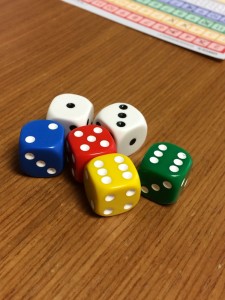
Qwixx is a better game than I thought it would be. Each game might play out in similar way but there are enough decisions and managing of risk that players will be entertained. This is a good game to play with all members of your family, ages eight and up. Qwixx falls into a weird category for me. I think of it as a pre-gateway game. Something to start off a night with a quick game and introduce a deeper approachable game before you play Carcassonne or Ticket to Ride. Because of this, it falls short of being what I consider a Spiel Des Jahres nominee, but that doesn’t mean it’s a bad game. If you are looking for a game to replace that worn out never played copy of Yahtzee and never look back, add Qwixx to your collection.
If you are interested in getting a copy for yourself, it’s about $11
Final Score: 3 Stars – A fun dice rolling game that has more interesting elements than most games in the same category.
 Hits:
Hits:
• Makes you make calculated decisions each turn
• Players are involved with every turn of the game
• Great design on the box
Misses:
• Each game feels the same
• Some frustration can occur as you attempt to lock out rows





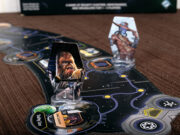

















Question: do we see each other’s scorecards or are they supposed to be kept private?
Lauren,
The rulebook doesn’t mention a specific way to deal with this issue. I have always played with the information on the scorecard is public knowledge. In my games, I didn’t see players making decisions based on how the other players are doing.
I justed wanted to make a comment on the value of Qwixx: I like games like this that are easy to play and don’t require significant strategy to play. They allow for conversation between players. It’s like “background music” for a pleasant evening.
Anyone with a bit of strategy will watch what others are doing. You can see their cards to make sure an honest game is played. Often players may score the wrong thing and it helps to declare what you are scoring for each person each round before you pass the dice to the next player. It is great for just talking amongst friends. I suggest this for both party and strategy players alike. Its good to mix in a game that’s more chill.
We really like this game. Simple but so fun. It does allow conversation and it travels well. We were never sure . . . when the active player locks a row . . . only that player can take the points to mark the lock even though every player locks the row?
I agree Carrie. I have ended up playing the game quite a bit while traveling.
To answer your question… If a row is locked during the first action, it is possible that other players may, at the same time, also cross out the number on the extreme right and lock the same color-row. These players must also have previously crossed out at least five numbers in that row. This happens in about half the games I play.
If you already have a row locked and the roller rolls a number allowing a second row to be locked with the white die, can they also add one more x in another row to build their points. Or, does the game end immediately with the lock and they aren’t allowed to use the colored die?
Surprised you think there is more luck involved in yahtzee than in this game. There is for sure more scope for strategy and more decisions to be made during a game of yahtzee. I like both games but just found this comment strange?